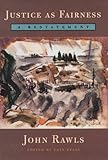Justice as fairness : a restatement / John Rawls ; edited by Erin Kelly.
By: Rawls, John, author
Contributor(s): Kelly, Erin
Language: English Publisher: Cambridge, Massachusetts : Harvard University Press, .2001Description: xviii, 214 pages : illustrations ; 24 cmContent type: text Media type: unmediated Carrier type: volumeISBN: 0674005104 (cloth : alk. paper); 0674005112 (pbk. : alk. paper); 9780674005112Subject(s): Justice | FairnessDDC classification: 320.011 LOC classification: JC578 | .R3693 2001| Item type | Current location | Home library | Call number | Status | Date due | Barcode | Item holds |
|---|---|---|---|---|---|---|---|
 BOOK
BOOK
|
COLLEGE LIBRARY | COLLEGE LIBRARY SUBJECT REFERENCE | 320.011 R199 2001 (Browse shelf) | Available | CITU-CL-43545 |
Nominated for Pulitzer Prizes 2002
Nominated for Frederic W. Ness Book Award 2003
Nominated for Rachel Carson Prize & Ludwik Fleck Prize 2002
Nominated for Littleton-Griswold Prize 2002
Includes bibliographical references and index.
Principles of Justice --
The Argument from the Original Position --
Institutions of a Just Basic Structure --
The Question of Stability.
This book originated as lectures for a course on political philosophy that Rawls taught regularly at Harvard in the 1980s. In time the lectures became a restatement of his theory of justice as fairness, revised in light of his more recent papers and his treatise Political Liberalism (1993). Rawls offers a broad overview of his main lines of thought and also explores specific issues never before addressed in any of his writings. He is well aware that since the publication of A Theory of Justice in 1971, American society has moved farther away from the idea of justice as fairness. Yet his ideas retain their power and relevance to debates in a pluralistic society about the meaning and theoretical viability of liberalism. This book demonstrates that moral clarity can be achieved even when a collective commitment to justice is uncertain.

There are no comments for this item.